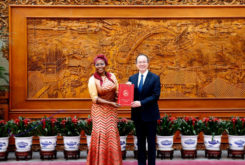Angola’s decision to leave the Organization of the Petroleum Exporting Countries could open the way for Beijing to increase investment in the country’s oil and other sectors, according to energy sector analysts.
Angola said on Thursday it was leaving OPEC, effective from Jan. 1, following a row with the producer group over the size of its output quota.
The decision also follows an agreement signed between China and Angola this month on enhanced cooperation. “China stands out as a pivotal and proven partner,” Angola’s Foreign Minister Tete Antonio said during a visit to Beijing when the deal was signed.
Angola, for which oil constitutes 90% of exports, is seeking to diversify its economy, but it also needs revenue. Antonio said Angola acknowledged the importance of technology, a skilled workforce and strategic partnerships that could help the country move on from oil, and called for more Chinese investment particularly in the country’s coffee, batteries, and solar energy sectors.
Freedom from OPEC output constraints could therefore allow China to increase its role in the oil sector, which has struggled from years of underinvestment.
“If they feel there is scope for them to find new investment from China to grow oil production, then perhaps that’s the source of motivation to re-engage with the Chinese,” Yvette Babb, portfolio manager at William Blair, told Reuters.
Chinese-built Infrastructure in Angola is “Source of Pride for the Country”
“Because while they need to diversify away from oil as a driver of growth, they do not have sufficient non-oil sources of revenue to sufficiently finance that diversification.”
China has a vested interest in Angola’s quest to overhaul its economy because Luanda owes Chinese creditors just under USD 21 billion, according to World Bank data.
Angola’s oil output has meanwhile shrunk for want to investment. The net result has been a fall in Angola’s oil shipments to China of nearly 30% between 2020 and 2022.
China and Angola “An Example” for South-South Cooperation, MFA Says
“It makes sense for every resource-rich African country to diversify energy and revenue sources if they have the resources to do so, even if their pace might be slower than richer countries,” Hannah Ryder, CEO of Development Reimagined, an African-owned development consultancy headquartered in Beijing.
Chinese firms have invested just shy of USD 14 billion in Angola over the last decade, the bulk of which was in energy.
This year, Chinese investment into Angola consisted of USD 250 million from PowerChina, a state-owned civil engineering firm, into developing Angola’s telecommunications infrastructure, according to data from the American Enterprise Institute think tank.
China Eliminates Tariffs on 98% of Imports from Angola and Signs Investor Protection Agreement
In 2021, the company made two separate investments of USD 160 million and USD 150 million into Angola’s transport and healthcare sectors.
“We always hope to advance practical cooperation with Angola based on equality as well as mutual benefit,” Wang Wenbin, a Chinese foreign ministry spokesperson, told a regular news conference in Beijing on Friday, quoted by Reuters.
In its latest pitch to deepen its ties – and economic influence – in Africa, China will offer six countries, including Angola, tariff-free access to its massive consumer market on 98% of the goods that it imports, starting on Dec. 25, Christmas Day.




